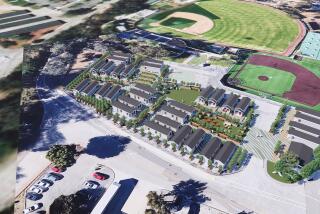UCLA Students in Uproar Over Permit-Parking Plan
- Share via
Protests erupted at UCLA this week when angry students discovered that nearby residents are attempting to eliminate up to 1,000 parking places on streets adjoining the crowded Westwood campus.
Members of the Westwood Hills Property Owners Assn. have petitioned the Los Angeles City Council to impose preferential parking on several streets west of the campus for residents with permits.
An aide to Councilman Zev Yaroslavsky said the council’s traffic and transportation subcommittee plans to recommend that the City Council approve the proposal on Friday.
Students, who hope to delay the council action, this week were collecting signatures on petitions asking the council to postpone any change until they are able to meet with homeowners.
“We now have 2,000 signatures and we’re shooting for 4,000” by the time the council subcommittee meets Friday morning, said student Brandon Smith, director of the UCLA Metro Lobby, which lobbies the city and county on issues affecting students.
University officials said parking is a serious problem. Full-time enrollment at UCLA stands at 35,000 students this year, yet there are only 18,000 parking places on campus to accommodate them along with an estimated 15,000 faculty and staff members, according to Charles Cuenod, assistant manager of campus parking services.
Students stand to lose up to 1,000 spaces on Westwood streets, Cuenod said. The area is bounded by Sunset Boulevard to the north, Veteran Avenue to the east, Montana Avenue to the south, and Sepulveda Boulevard to the west.
“We want to convince homeowners we’re not working against them,” said student Robert Rosenfeld, also of the UCLA Metro Lobby. “We need parking, they need parking and working against each other is self-defeating.”
Westwood Hills Property Owners president Harriet Miller said that although she sympathizes with the students, residents have been squeezed out of spaces. She called the parking permits a “last resort.”
Homeowners have complained that their driveways are blocked by commuting students and that students leave their cars parked on residential streets for weeks at a time, Miller said. They also worry about increased litter and reckless driving on their streets.
Still other residents say they have been the targets of burglaries and vandalism and have become suspicious of all cars parked outside their homes.
“Homeowners see strangers’ cars and they don’t know whether they’re students’ cars or whether they’re prospective burglars,” Miller said.
Miller, whose association represents 520 UCLA-area property owners, said homeowners may be less than eager to meet with students and work out a plan.
“There are problems with getting together,” Miller said, adding that her association is involved in several community development issues. “I really don’t know how we could do that.”
Rosenfeld accused homeowners of having a “defeatist attitude. I think they should take a more serious attitude and find the time,” Rosenfeld said. “It seems so ungrateful to act this way because their property values are enhanced because of UCLA.’
Miller, however, contended that the university is responsible for the parking problem, because it “has more students than it can handle. . . . Students have cars and they have to park them somewhere.”
She also blamed apartment owners who do not provide adequate parking for all their tenants, forcing students to scramble for spots.
University officials said they will add 2,000 spaces to campus parking lots during the next three years. This, however, would fall far short of the university’s needs.
Given Priority
Commuters are given priority for on-campus parking over those living in dormitories or in Westside-area apartments, Cuenod said.
“Parking tends to favor those who live farthest away and have off-campus commitments,” Cuenod said. “Those who live closest don’t get parking at all.”
UCLA officials said they try not to get involved in student-community disputes.
“You get caught in the middle of the town-and-gown argument basically,” Cuenod said. However, he added that “it sounds like a good idea if students and homeowners talk.”
Students accused the administration of taking an “isolationist” stance, leaving them in the middle of a dilemma.
Universal Goal
“I don’t know really what isolationist means in this context,” said Carole Magnuson, director of community relations for UCLA. “The universal goal is to increase parking on campus and we’re making progress in that direction.
“It certainly is the homeowners’ right and the City Council’s prerogative to make these decisions.” However, she calls the students’ efforts to work with homeowners “laudable.”
“Certainly I understand the students’ position entirely,” Magnuson said. “Anything they can do to achieve their goals is worth doing.”
The parking crunch has worsened because of the lack of student housing on campus and high Westside rents that force students to commute from less expensive apartments that are far away, Magnuson said. UCLA is working on a plan to provide on-campus housing for an additional 1,200 students, she said.
UCLA also offers car-pool incentives for students in an effort to cope with the parking problem, she said.
Residents have obtained permit parking on several residential streets east and south of the campus, administration officials said.
In this case, students are suggesting that one side of the street be available to them, the other to residents. Another possibility would be to allow students to park on the streets only during the daytime hours, Smith said.
If the permit parking passes, students said they would park south of Wilshire Boulevard or west of Sepulveda Boulevard and walk or ride their bicycles into campus, Smith said.
More to Read
Sign up for Essential California
The most important California stories and recommendations in your inbox every morning.
You may occasionally receive promotional content from the Los Angeles Times.










